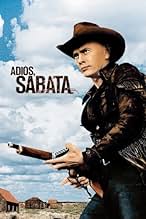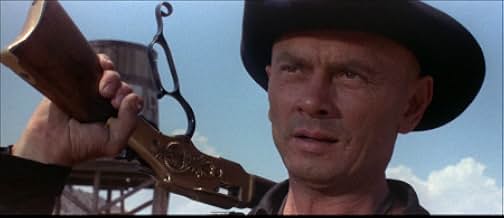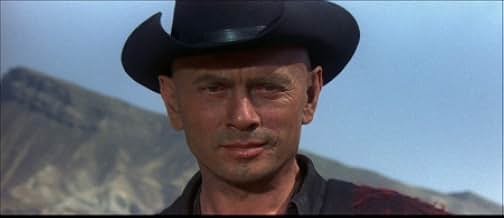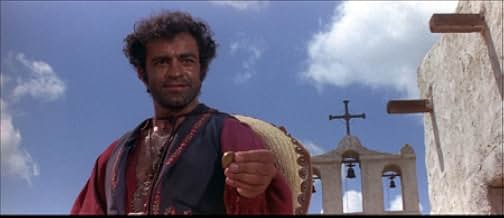VALUTAZIONE IMDb
5,9/10
2468
LA TUA VALUTAZIONE
Il maestro pistolero Sabata aiuta una banda di rivoluzionari messicani a rubare un carro d'oro.Il maestro pistolero Sabata aiuta una banda di rivoluzionari messicani a rubare un carro d'oro.Il maestro pistolero Sabata aiuta una banda di rivoluzionari messicani a rubare un carro d'oro.
- Regia
- Sceneggiatura
- Star
Ignazio Spalla
- Escudo
- (as Pedro Sanchez)
Gérard Herter
- Colonel Skimmel
- (as Gerard Herter)
Turam Quibo
- Gitano
- (as Joseph Persaud)
Nieves Navarro
- Kingsville Saloon Dancer
- (as Susan Scott)
Vittorio Caronia
- 1st Lt. Steiner
- (as Vitti Caronia)
Recensioni in evidenza
Yul Brynner and Dean (The Red Elvis) Reed team up with a group of Mexican revolutionaries in order to steal a shipment of gold belonging to the invading Austrian army and use it to buy guns for the resistance. However, the vicious Austrian occupiers have a few tricks up their sleeves and so does Brynner.
Yul's only real spaghetti western, his performance, flamboyant outfit, and neat gun-play elevates this very much typical, though well-made production to a higher level than it otherwise would have been. It's still too bland though.
The score by frequent Ennio Morricone collaborator Bruno Nicolai is pretty good.
From the producers and director of the earlier Sabata, this similarly themed film only became a sequel in the dubbing booth.
Yul's only real spaghetti western, his performance, flamboyant outfit, and neat gun-play elevates this very much typical, though well-made production to a higher level than it otherwise would have been. It's still too bland though.
The score by frequent Ennio Morricone collaborator Bruno Nicolai is pretty good.
From the producers and director of the earlier Sabata, this similarly themed film only became a sequel in the dubbing booth.
In his one and only venture into the pasta western, Yul Brynner finds himself succeeding Lee Van Cleef as the mysterious gunfighter Sabata who gets himself involved in Mexican politics in trying to overthrow the Emperor Maximilian. There hasn't been a film yet where the Juaristas aren't the good guys, even in Juarez where Brian Aherne made a sympathetic if somewhat naive Maximilian. It's such a clear case of imperialism.
But Yul isn't a total good guy and he teams up with three partners to steal a shipment of gold from the occupiers and give it to the Juaristas ostensibly. Actually the four of them are only as good as they have to be. And they've got another along, an American played by the only American actor in Adios Sabata, Dean Reed, who has an agenda all his own who keeps a positively explosive diary.
As most of us know even those who get their history from films, the Emperor Maximilian was an Austrian, but who was put on the newly created Mexican throne by the French and sustained by the French army. But here we have Austrian occupiers including an Austrian commander who also has a private agenda. I'm betting the producers were thinking that German types make so much better villains than the French.
Sabata's distinguishing characteristic was a rife that he had a long holster for and drew like a revolver. This rife had a unique horizontal magazine from where the bullets came. But the last chamber always had a cigar which Yul would light up after a killing well done.
I'm not a fan of spaghetti westerns and don't usually give them good reviews. It's the American genre and should be done by Americans. This one is no exception. But I will say that Yul Brynner's cynical look throughout the film is quite priceless.
But Yul isn't a total good guy and he teams up with three partners to steal a shipment of gold from the occupiers and give it to the Juaristas ostensibly. Actually the four of them are only as good as they have to be. And they've got another along, an American played by the only American actor in Adios Sabata, Dean Reed, who has an agenda all his own who keeps a positively explosive diary.
As most of us know even those who get their history from films, the Emperor Maximilian was an Austrian, but who was put on the newly created Mexican throne by the French and sustained by the French army. But here we have Austrian occupiers including an Austrian commander who also has a private agenda. I'm betting the producers were thinking that German types make so much better villains than the French.
Sabata's distinguishing characteristic was a rife that he had a long holster for and drew like a revolver. This rife had a unique horizontal magazine from where the bullets came. But the last chamber always had a cigar which Yul would light up after a killing well done.
I'm not a fan of spaghetti westerns and don't usually give them good reviews. It's the American genre and should be done by Americans. This one is no exception. But I will say that Yul Brynner's cynical look throughout the film is quite priceless.
Long before the Terminator, Sabata (this time Yul Brynner in his only spaghetti western) uttered the infamous words, "I'll be back." This is the second of Gianfranco Parolini's Sabata trilogy, but it is not a sequel, as the characters and story are different. Like the first, it is also written by Renato Izzo, who went on to write the video nasty Night Train Murders after finishing the trilogy.
Brynner had the cool look that probably got him the Westworld gig a few years later.
Ignazio Spalla is back from the fist film, but with a different name (Escudo). Maybe he changed it to hide.
Sabata joins Escudo and revolutionaries trying to overthrow Austrian Archduke Maximillion, who ruled over Mexico as an imperial dictator; of course, Sabata was only after gold. Others were as well, so it was not a walk in the park.
It is fortunate that the Archduke had plenty of soldiers to sacrifice to the cause.
Well, Lee Van Cleef, Ignazio Spalla, and Aldo Canti will be back in the final Sabata film.
Brynner had the cool look that probably got him the Westworld gig a few years later.
Ignazio Spalla is back from the fist film, but with a different name (Escudo). Maybe he changed it to hide.
Sabata joins Escudo and revolutionaries trying to overthrow Austrian Archduke Maximillion, who ruled over Mexico as an imperial dictator; of course, Sabata was only after gold. Others were as well, so it was not a walk in the park.
It is fortunate that the Archduke had plenty of soldiers to sacrifice to the cause.
Well, Lee Van Cleef, Ignazio Spalla, and Aldo Canti will be back in the final Sabata film.
This is not the same "Sabata" character as in the Lee Van Cleef movies. This character was actually supposed to be named "Indio Black" but they changed his name for the English version. Why they thought that a western with a big star like Yul Brynner wouldn't be popular enough on it's own, and tried to cash in on the Sabata name is beyond me, but studios and distributors did a lot of stupid things to film titles back then, especially with the international releases, so it's par for the course.
Yul Brynner is interesting as the protagonist in this film. Too bad he didn't appear in any other spaghetti westerns. He's no Lee Van Cleef, but he does have a style of his own. His accent makes him sound like Arnold Schwartzeneggar in some parts. Gerard Herter is great as the wicked, Nazi-like Austrian Colonel. I wasn't very impressed with any of the other actors in the movie. Dean Reed was especially awful, and his character, "Ballantyne" was very irritating. I kept hoping he would get killed throughout the whole movie, but that damned Indio Black kept saving him.
The music score is OK, but not as good as most of Bruno Nicolai's other work, and there are very long stretches of the film with no music at all where it probably could use some.
The movie drags a little from the middle to the end. There's lots of action, but it just doesn't have the pizazz or suspense of the really great spaghetti westerns. It would probably be better if it was shorter. Some movies, like Sergio Leone's westerns for example, are able to go on for 2 or 3 hours and not have a dull moment, but this movie isn't one of them. It could have been 15 or 20 minutes shorter.
Overall, the production quality is good, and the story is OK, though it's nothing original. This one is worth watching, but probably for spaghetti western fans only.
Yul Brynner is interesting as the protagonist in this film. Too bad he didn't appear in any other spaghetti westerns. He's no Lee Van Cleef, but he does have a style of his own. His accent makes him sound like Arnold Schwartzeneggar in some parts. Gerard Herter is great as the wicked, Nazi-like Austrian Colonel. I wasn't very impressed with any of the other actors in the movie. Dean Reed was especially awful, and his character, "Ballantyne" was very irritating. I kept hoping he would get killed throughout the whole movie, but that damned Indio Black kept saving him.
The music score is OK, but not as good as most of Bruno Nicolai's other work, and there are very long stretches of the film with no music at all where it probably could use some.
The movie drags a little from the middle to the end. There's lots of action, but it just doesn't have the pizazz or suspense of the really great spaghetti westerns. It would probably be better if it was shorter. Some movies, like Sergio Leone's westerns for example, are able to go on for 2 or 3 hours and not have a dull moment, but this movie isn't one of them. It could have been 15 or 20 minutes shorter.
Overall, the production quality is good, and the story is OK, though it's nothing original. This one is worth watching, but probably for spaghetti western fans only.
Ok so it was supposed to be called INDIO BLACK as well as it should have been.
After all, Yul Brynner played the character far differently than Lee Van Cleef did and this film really shouldn't be associated with the other two Sabata films. It's a different character look altogether with the Brynner version dressed in black buckskin and silver buckles while the Van Cleef version of Sabata settled more for the conservative Bret Maverick gambler look.
Also notably stars failed American singer Dean Reed who would later die under mysterious circumstances in East Germany during the 1980s.
The Bruno Nicolai score is excellent although derivative of other scores for the genre. If you like soundtracks for these types of films, then it's well worth picking up. I know I'll be on the lookout for it.
Lots of explosions and gunfire in this one as Brynner & Co. battle the Austrians under Maximillian (in Mexico circa 1867) and steal their gold. There's nothing boring about it and it's face-paced with a few tricks such as the model of the ship in Colonel Skimmel's study that shoots real live ammo everytime someone opens the drawer below it. I also like Brynner's sawed-off rifle with the clip that loads from the side. He keeps a cigar in the last chamber and lights it up after every gun battle. Very tongue-in-cheek.
I liked it. Too bad the widescreen version was cropped for television.
6 out of 10
After all, Yul Brynner played the character far differently than Lee Van Cleef did and this film really shouldn't be associated with the other two Sabata films. It's a different character look altogether with the Brynner version dressed in black buckskin and silver buckles while the Van Cleef version of Sabata settled more for the conservative Bret Maverick gambler look.
Also notably stars failed American singer Dean Reed who would later die under mysterious circumstances in East Germany during the 1980s.
The Bruno Nicolai score is excellent although derivative of other scores for the genre. If you like soundtracks for these types of films, then it's well worth picking up. I know I'll be on the lookout for it.
Lots of explosions and gunfire in this one as Brynner & Co. battle the Austrians under Maximillian (in Mexico circa 1867) and steal their gold. There's nothing boring about it and it's face-paced with a few tricks such as the model of the ship in Colonel Skimmel's study that shoots real live ammo everytime someone opens the drawer below it. I also like Brynner's sawed-off rifle with the clip that loads from the side. He keeps a cigar in the last chamber and lights it up after every gun battle. Very tongue-in-cheek.
I liked it. Too bad the widescreen version was cropped for television.
6 out of 10
Lo sapevi?
- QuizThis was not originally a Sabata film. The original Italian title translates as "Indio Black, you know what? You're a big son of a...", Indio Black being the character played by Yul Brynner, but the title and Brynner's character name were changed for the American release to cash in on Ehi amico... c'è Sabata. Hai chiuso! (1969), the original Sabata film. Lee Van Cleef was asked to star in this film, but rejected the offer for some reason. He was then replaced by Brynner, whose character would only be called Sabata in the international English language version, and Indio Black in the Italian version. However, lip reading viewers have noticed that the actors who mouth their lines in English, seem to say "Sabata", not "Indio", so the re-baptism took place while the film was still being shot.
- BlooperWhen Sabata invades Colonel Skimmel's quarters, he sees the reflection of a person hiding behind the door. The person in the reflection is not Hertz.
- ConnessioniEdited into Spaghetti Western Trailer Show (2007)
I più visti
Accedi per valutare e creare un elenco di titoli salvati per ottenere consigli personalizzati
Dettagli
Botteghino
- Lordo Stati Uniti e Canada
- 546.926 USD
- Tempo di esecuzione1 ora 44 minuti
- Proporzioni
- 2.35 : 1
Contribuisci a questa pagina
Suggerisci una modifica o aggiungi i contenuti mancanti

Divario superiore
By what name was Indio Black, sai che ti dico: Sei un gran figlio di... (1970) officially released in India in English?
Rispondi




























